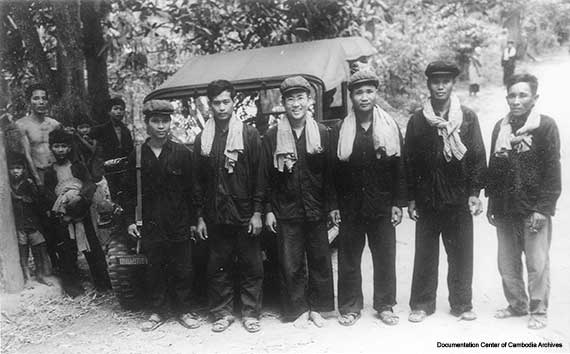|

Chinese advisers and Khmer Rouge soldiers pose for a photo. Source:
Documentation Center of Cambodia Archives.
Promoting
Accountability
2000-present
Our Accountability Project focuses on
fact-finding in an effort to promote justice and a better historical
understanding of the Democratic Kampuchea (DK) regime. In
particular, we aim to shed light on the roles and activities of the
lower-level personnel who were charged with implementing policies
and directives of the Communist Party of Kampuchea (CPK).
The project is directly relevant to the
cases against senior surviving Khmer Rouge leaders at the
Extraordinary Chambers in the Courts of Cambodia (ECCC). It
provides a way to illuminate chains of command, reporting practices,
and other institutional features of the DK regime that can help to
hold leaders accountable for atrocities committed in the field. The
ECCC has already drawn extensively on our findings to that end.
The Accountability Project also serves
a crucial truth-telling function. Most Cambodian survivors have
never seen or met the senior officials on trial at the ECCC. The
abuses seared in their memories are overwhelmingly local in nature.
In the absence of a formal truth commission, most survivors will
have little opportunity to share their stories in detail or to learn
a history of the DK regime that focuses on the types of atrocities
they observed in their communes and cooperatives. We aim to help
fill that gap.
Between 2000 and 2007, we conducted
over 10,000 interviews with Khmer Rouge cadres, their family
members, and victims across the country. We began by looking at the
CPK biographies in our documentary files to identify the names,
birthplaces and other basic information on thousands of former Khmer
Rouge cadres. Teams of researchers moved from province to province,
locating and interviewing many of the individuals in question. We
have also entered data about individual interviewees into our
“Accountability Database.” We have taken appropriate precautions
regarding the recording, use, and dissemination of that data to
ensure the security of our interviewees.
In 2004, we undertook a study with Dr.
Stephen Heder of the School of Oriental and African Studies at the
University of London, who is one of the world’s leading experts on
modern Cambodian history. Dr. Heder analyzed approximately 100
interviews (about 2,000 pages) to determine if they provide
information relevant to the cases of the former Khmer Rouge
officials most likely to stand trial. Dr. Heder wrote English
summaries of the historically salient points in selected interviews,
while preparing the materials for legal analysis and presentation to
the ECCC. In addition, he accompanied our field teams to conduct
several follow-up interviews with cadres who may be important in
providing indications of the leadership chain of the Khmer Rouge. He
completed his analysis in December 2004, and we provided it to the
ECCC.
We now plan to undertake a more comprehensive analysis of the
transcripts in our files. We have more than 100,000 pages of
transcripts in Khmer in addition to the English summaries prepared
by Dr. Heder. In the next stage of the project, we will organize a
team of staff members to review the Khmer transcripts and prepare
summaries in Khmer and English identifying key information relevant
to the crimes and institutional features of the DK regime. Dr. John
D. Ciorciari of the University of Michigan, a specialist in
international law, will advise the team and help oversee the review
process. We will prepare the summaries with an eye toward the
preparation of definitive academic publications on lower-level Khmer
Rouge offenses in the future.
Reports
Photos by
Provinces
Contact:
Long Dany
Team Leader
|